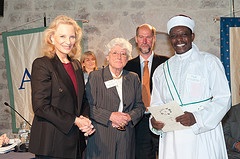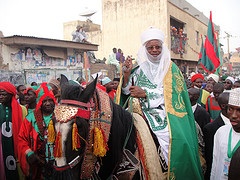|
|
|
|
 |
|
Kano, Nigeria
This page has not been updated since June 2014.
Kano State, Northern Nigeria
A founding member of the Green Pilgrimage Network
Kano, Nigeria is one of nine cities and 22 different organisations and faiths that joined as founding members of the Green Pilgrimage Network, launched at Assisi, Italy, during ARC's Sacred Land Celebration, October 31-Nov 2, 2011. The founder members from Kano are:
 |
 |
 |
HRH Princess Michael of Kent; The Hon Mrs Sara Morrison, Vice President Emeritus of WWF International; ARC Secretary-General Martin Palmer and Mal. Yassin Garba Maisikeli, representing Sheikh Qaribullah Nasir Kabara, spiritual leader of the Qadiriyyah Sufi Movement in Africa, at a ceremony commemorating the pilgrim city of Kano, Nigeria, becoming a founder member of the Green Pilgrimage Network. |
Sheikh Kabara, The Qadiriyyah Sufi Movement
State Government of Kano
Municipal Local Government
One and a half million Muslim pilgrims from West Africa come to Kano each year to visit the tombs of the local Qadiriyyah Saints for the annual Maukib festival.
The plan to make Kano a Green Pilgrim City has the backing of the State Governor of Kano and the spiritual leader of the Qadiriyyah Sufi Movement in Africa, Sheikh Kabara.
 |
 |
 |
Sheikh Qaribullah, spiritual leader of Islam's Qadiriyyah tradition in Africa, at the annual Maukib procession and celebration in Kano in 2007. |
A Charter to green the city has been drawn up and signed by the State government and the eight municipal local governments as well as the Qadiriyyah Movement which is the largest Islamic sect in Nigeria, with 15 million followers.
Progress so far
For the Maukib pilgrimage they now plan to ban cars and motorcycles travelling to the site and to install mobile drinking water dispensers, rubbish bins and adequate toilet facilities along pilgrimage routes on the days around Maukib day.
For the city, throughout the year, Kano plans:
to introduce electric buses, and have an annual reduction of carbon emission by 15 percent.
local school children will be involved in a pick up campaign of plastic water bags from the streets
roads and traffic lights will be lit by solar powered lighting
all streets will have more trees planted along them
alternative energy technologies will be installed in public mosques.
Green Vanguards
Despite serious disruption caused by sectarian violence in the region the 2013 Maukib was eventually able to go ahead in March, with a Hausa edition of the Green Guide to Hajj being launched by the Qadiriyyah Movement also providing useful advice for Maukib pilgrims. Green Vanguards were appointed to spread environmental awareness among the one and a half million people from West Africa who come to visit the tombs of the local Qadiriyyah saints.
Useful links
Kano City - Green Pilgrimage Theological Statement
Download the full Green Pilgrimage Network handbook here
|
 |
|
|
|
|
|
 |
The Muslim Declaration on Nature - Assisi 1986
The original Muslim Declaration on Nature was created in 1986, at a meeting held in Assisi by WWF-International. It stemmed from an idea by HRH the Prince Philip, at which five leaders of the five major world religions – Buddhism, Christianity, Hinduism, Islam and Judaism – were invited to come and discuss how their faiths could help save the natural world. |
 |
ARC and the Faiths
Faith communities are working in countless ways to care for the environment. This section outlines the basics of each faith’s history, beliefs and teachings on ecology. |
 |
ARC at a glance
ARC is a secular body that helps the major religions of the world to develop their own environmental programmes, based on their own core teachings, beliefs and practices. |
 |
 |
|
|

